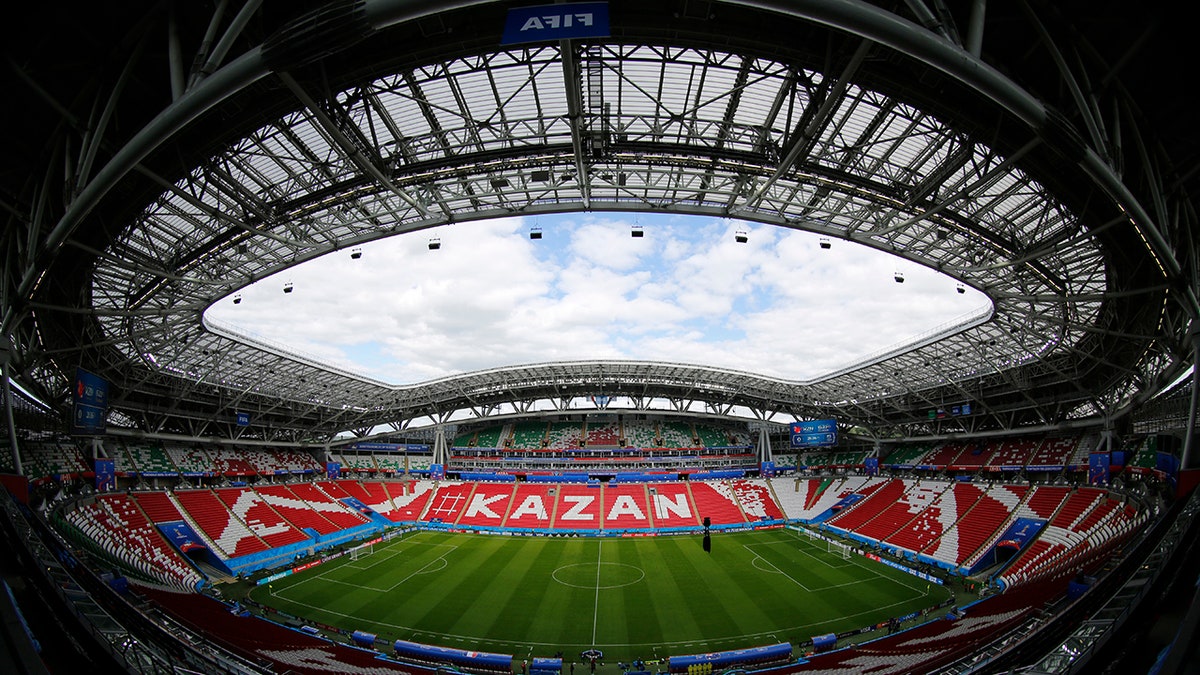
A general view shows the Kazan Arena before the Australia's official training for the group C match between France and Australia at the 2018 soccer World Cup in the Kazan Arena in Kazan, Russia, Friday, June 15, 2018. (AP Photo/Hassan Ammar) (Copyright 2018 The Associated Press. All rights reserved.)
If anyone has reason to ignore the 2018 World Cup currently being staged in Russia, I do. I don’t play soccer, and the tournament is being hosted by the nation that has violated the sovereignty of Ukraine, my homeland. And yet I’m delighted that the eyes of the world are turned there.
Why? Because I believe the World Cup provides an unprecedented opportunity for the church in Russia, at a time when the doors for religious freedom seem to be in danger of closing.
And together with my colleagues at Mission Eurasia, a U.S.-based nonprofit that trains and equips young Christian leaders for ministry across the former Communist region, I’m hoping the event prompts a worldwide outpouring of prayer for a nation so in need of the gospel.
Drawing a massive global television audience, the competition comes at an interesting time for Russia. It generates widespread international goodwill for the country, even as Russia pursues an increasingly isolationist position.
While meddling beyond its borders, Russia is also actively restricting freedoms at home for non-Orthodox Christians and other religious minorities. Legislation passed in 2016 under the guise of counter-terrorism measures has restricted Christians’ rights to share their faith outside the walls of registered churches. According to watchdogs, there have been more than 600 cases of religious freedom violations in the past two years.
This troubling move recently prompted Bishop Sergey Ryakhovskiy, the spokesperson for all Russian Protestants, to call churches to join a national day of fasting and prayer on June 17. Thousands of churches formed a continuous prayer chain across Russia’s 11 time zones, asking God for the freedom to share the gospel during the World Cup.
I remember vividly during the Soviet regime how believers used all kinds of events to spread the gospel—even turning wedding ceremonies and funeral processions into opportunities for evangelism.
“Today we are witnessing evangelical churches in different regions of the country being put under pressure,” Ryakhovskiy said, announcing the day of prayer. “We believe that it is not only our legal right, but also that the blessing of our land and prosperity of the people directly depend on how much the country and the people are open to preaching the gospel.”
The World Cup has been providing a rare window of opportunity for churches to do that by using public events. With evangelistic activity restricted to officially recognized churches by the new laws, several hundred across the country have been hosting free, live big-screen broadcasts of the competition.
At these “fan zones,” visitors have been watching the televised action, enjoying free refreshments and snacks, getting the chance to hear the gospel and receiving free evangelistic literature and Scripture.
This creative initiative, developed and sponsored by Mission Eurasia, harkens back to a previous time when religious freedom in Russia was under threat. I remember vividly during the Soviet regime how believers used all kinds of events to spread the gospel—even turning wedding ceremonies and funeral processions into opportunities for evangelism.
Mission Eurasia’s World Cup outreach stands on the shoulders of those faithful and determined believers, taking advantage of a “wide door” of opportunity for witnessing to millions—such as the apostle Paul wrote of in 1 Corinthians 16:9.
As the tournament reaches a climax this week, please join us in prayerful solidarity with those who—without fear of reprisal—are fully capitalizing on whatever opportunities for evangelism still exist in this vast country.
